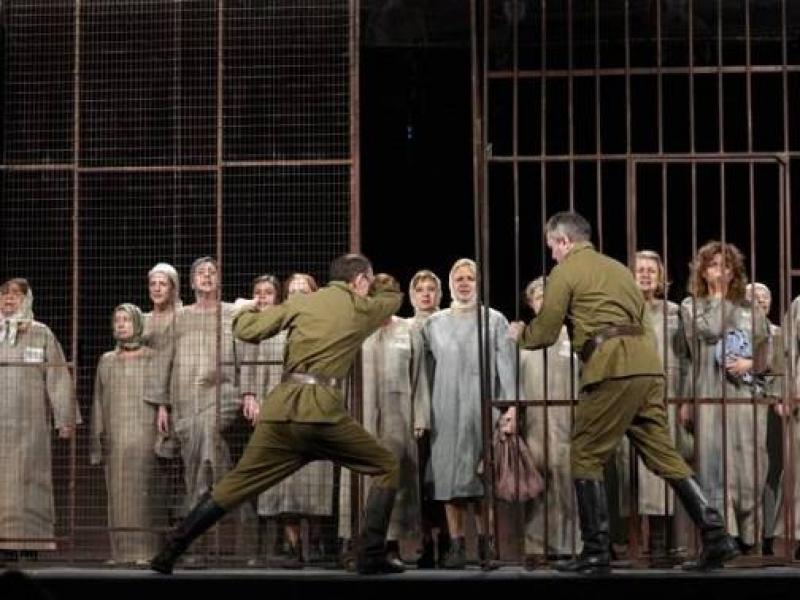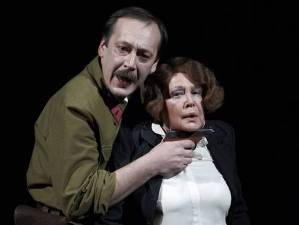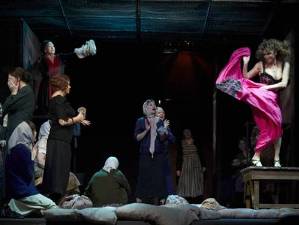Into the Whirlwind, Sovremennik, Noël Coward Theatre | reviews, news & interviews
Into the Whirlwind, Sovremennik, Noël Coward Theatre
Into the Whirlwind, Sovremennik, Noël Coward Theatre
Strong Russian ensemble work in this drama of Stalin's purges

Tradition has often bedded down very comfortably in the Russian performing arts, which ought to be an asset in the current vortex but brings mixed blessings. Detailed ensemble work, the Moscow Sovremennik Theatre's strongest asset, takes time to develop, yet actors with roles for life may be slow to yield to fresh blood.
Certainly the continuity of the Sovremennik ("Contemporaryite") company's history is daunting. You can read more about it in Tom Birchenough's lucid introduction on theartsdesk, so I won't repeat much of what he says here except to note that Volchek started out as a Moscow Arts Theatre-trained graduate, class of 1956, when the authorities first repudiated the three-years-dead Stalin; after many censorial vicissitudes, she unveiled this eminently theatrical adaptation of gulag survivor and history professor Yevgenia Ginzburg's Into the Whirlwind in the equally memorable milestone of 1989. But yesterday's radicals can become today's monument. You can see why this production moved the likes of Bill Clinton, Arthur Miller and Jane Fonda on its American tour, and I wish Sovremennik had made it to these shores earlier than it now has, courtesy of ever so slightly improbable support from Roman Abramovich.
 What are the drawbacks, if one dare mention them in such a sacred rite? Well, much-respected actress Marina Neelova may be a fine institution, but she's nearly twice the age good Communist Ginzburg was when she found herself thrown into prison on trumped-up charges of counter-revolutionary activity in 1937. It matters, because we're several times told how youthful is our heroine, and how she has three young children to think about (her emotion over their being deprived of their mother is crucial).
What are the drawbacks, if one dare mention them in such a sacred rite? Well, much-respected actress Marina Neelova may be a fine institution, but she's nearly twice the age good Communist Ginzburg was when she found herself thrown into prison on trumped-up charges of counter-revolutionary activity in 1937. It matters, because we're several times told how youthful is our heroine, and how she has three young children to think about (her emotion over their being deprived of their mother is crucial).
Neelova doesn't entirely convince in her breakdowns but is good at the dignity of staying honest at all costs. This is one of the core themes of the book and the play, as indeed it is of the deservedly popular novel of the moment, Hans Fallada's Alone in Berlin (not entirely irrelevant: the great writer who stayed on under Nazism and only just outlived it took his nom de plume from an ETA Hoffmann story, and Hoffmannesque fantasy is invoked by one of the women prisoners during Into the Whirlwind's second-act uproar following a German actress's narrative). The one moment where a lump truly came to my throat was the way Neelov characterised Ginzburg's brutalisation at the hands of a former student (Vladislav Vetrov, chillingly casual in his violence, pictured with Neelova above right).
Unfortunately, it seems that the Sovremennik company's home base is an easier space in which to project the favoured naturalistic delivery - not to be confused with the "theatre mumbling" excoriated here last week bv Carole Woddis, though Stanislavsky may be a common link - than the not-very-amenable Noël Coward Theatre; much of the dialogue was lost to where I was sitting beneath the balcony overhang. That meant that the pathos of several tragic narratives, especially the one from Ginzburg's cellmate Milda (Marina Khazova), don't reach to the back of the stalls. There are several stronger-voiced cameos, though the one from another much-loved Russian actress - Liya Akedzhakova - didn't seem to me to merit the applause on her entrance, even if I could see why the lines of a peasant woman outraged at being accused of "intellectual" crimes merited more clapping from the many Russians in the audience.
By then, the message that half the women still have faith in their Beloved Leader and Teacher Stalin, who would never permit such institutionalised brutality if he got to hear about it, comes across loud and clear. And some of us eventually got used to the admirably operated but incredibly speedy rolling surtitles to the sides of the stage; I found my faltering Russian very much needed them, given the naturalistic rapidity of delivery, though I could understand every word delivered by the schoolmistress from Kazan.
 Very much the peak of the company's achievement, in fact, is the realistic interplay of the women prisoners in the broader canvas of the second act, from the clinking and scraping of tin mugs - earlier, we're given a vivid demonstration of the coded tapping on cell walls - to the totally convincing flow of emotions from humour and euphoria to despair and anger. At the centre of this is the pacy scene in which Olga Drozdova's Karolla narrates her dancer's love story, simultaneously translated from the German by Neelova's now quietly authoritative Ginzburg (Karolla dances for the women, pictured above left).
Very much the peak of the company's achievement, in fact, is the realistic interplay of the women prisoners in the broader canvas of the second act, from the clinking and scraping of tin mugs - earlier, we're given a vivid demonstration of the coded tapping on cell walls - to the totally convincing flow of emotions from humour and euphoria to despair and anger. At the centre of this is the pacy scene in which Olga Drozdova's Karolla narrates her dancer's love story, simultaneously translated from the German by Neelova's now quietly authoritative Ginzburg (Karolla dances for the women, pictured above left).
Given such loving ensemble work, it's easy not to worry about where the narrative might be leading. Even so, I wonder whether there's less edge than there used to be to the final coup, with the women, having held on to their Soviet principles and marched to what they think will be a joyful labour in the east, freezing in a famous final tableau of despair. Mikhail Frenkel's oppressive low-ceilinged designs for the prison rooms work well; less so the sound-score, which sounds like something created by the BBC Radiophonic Workshop in the 1960s. I left admiring the preservation of a classic but not, in spite of the eloquently argued subject matter, deeply moved. So let's see whether the company can give us the famed Russian comic side of Chekhov next week.
Explore topics
Share this article
Add comment
The future of Arts Journalism
You can stop theartsdesk.com closing!
We urgently need financing to survive. Our fundraising drive has thus far raised £33,000 but we need to reach £100,000 or we will be forced to close. Please contribute here: https://gofund.me/c3f6033d
And if you can forward this information to anyone who might assist, we’d be grateful.

Subscribe to theartsdesk.com
Thank you for continuing to read our work on theartsdesk.com. For unlimited access to every article in its entirety, including our archive of more than 15,000 pieces, we're asking for £5 per month or £40 per year. We feel it's a very good deal, and hope you do too.
To take a subscription now simply click here.
And if you're looking for that extra gift for a friend or family member, why not treat them to a theartsdesk.com gift subscription?
more Theatre
 Shanghai Dolls, Kiln Theatre review - fascinating slice of history inadequately told
Amy Ng's take on two Chinese titans needs more dramatic ballast
Shanghai Dolls, Kiln Theatre review - fascinating slice of history inadequately told
Amy Ng's take on two Chinese titans needs more dramatic ballast
 Manhunt, Royal Court review - terrifyingly toxic masculinity
After his Olivier Award win for Oedipus, Robert Icke turns to a modern “monster”
Manhunt, Royal Court review - terrifyingly toxic masculinity
After his Olivier Award win for Oedipus, Robert Icke turns to a modern “monster”
 Midnight Cowboy, Southwark Playhouse - new musical cannot escape the movie's long shadow
Two misfits misfire in misconceived show
Midnight Cowboy, Southwark Playhouse - new musical cannot escape the movie's long shadow
Two misfits misfire in misconceived show
 Thanks for Having Me, Riverside Studios review - snappily performed comedy with a lightweight core
Writer-actor Keelan Kember floods the stage with a torrent of gags but few ideas
Thanks for Having Me, Riverside Studios review - snappily performed comedy with a lightweight core
Writer-actor Keelan Kember floods the stage with a torrent of gags but few ideas
 Rhinoceros, Almeida Theatre review - joyously absurd and absurdly joyful
Ionesco classic gets an entertainingly vivid and contemporary update
Rhinoceros, Almeida Theatre review - joyously absurd and absurdly joyful
Ionesco classic gets an entertainingly vivid and contemporary update
 The Importance of Being Oscar, Jermyn Street Theatre review - Wilde, still burning bright
Alastair Whatley honours his subject in a quietly powerful performance
The Importance of Being Oscar, Jermyn Street Theatre review - Wilde, still burning bright
Alastair Whatley honours his subject in a quietly powerful performance
 Stiletto, Charing Cross Theatre review - new musical excess
Quirky, operatic show won't please everyone, but will delight many
Stiletto, Charing Cross Theatre review - new musical excess
Quirky, operatic show won't please everyone, but will delight many
 Alfred Hitchcock Presents: The Musical, Theatre Royal Bath review - not a screaming success
1950s America feels a lot like 2020s America in this portmanteau show
Alfred Hitchcock Presents: The Musical, Theatre Royal Bath review - not a screaming success
1950s America feels a lot like 2020s America in this portmanteau show
 Wilko: Love and Death and Rock'n'Roll, Southwark Playhouse review - charismatic reincarnation of a rock legend
Johnson Willis captures the anarchic energy and wit of the late guitarist
Wilko: Love and Death and Rock'n'Roll, Southwark Playhouse review - charismatic reincarnation of a rock legend
Johnson Willis captures the anarchic energy and wit of the late guitarist
 Dear England, National Theatre review - extra time for stirring soccer classic
James Graham adds a neat coda to his ode to decency in sport
Dear England, National Theatre review - extra time for stirring soccer classic
James Graham adds a neat coda to his ode to decency in sport

Comments
...
...
...
...